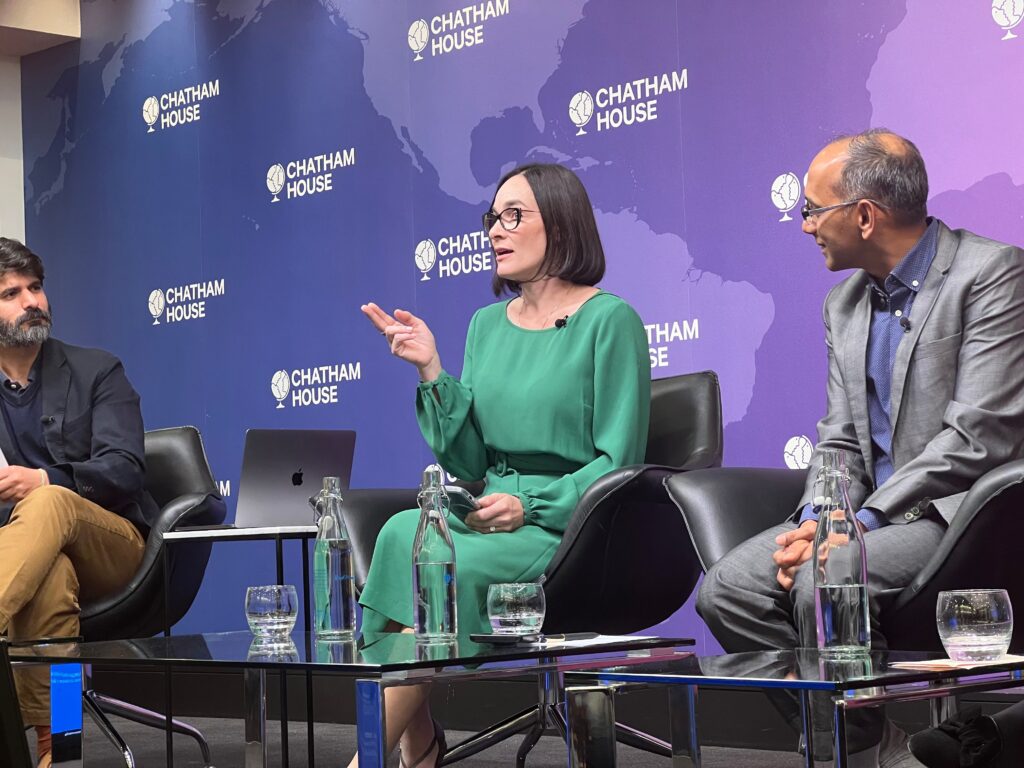The role of think tanks amid political uncertainty: Building trust
R Street Institute Executive Director Erica Schoder delivered these remarks at Chatham House in May as part of 2023’s On Think Tanks Conference. The panel discussed “how persistent and new forms of political uncertainty impact on their work and what can they do to counter it.”
Lack of trust. This is what political uncertainty looks like in the United States today. Lack of trust in our institutions—from Congress to the judiciary—in our elections and in the political process itself.
This lack of trust creates a doom loop of uncertainty and instability. No matter where we are on the globe, evidence of this lack of trust is all around us. We see and feel how it has infiltrated not just our political discourse but our individual relationships. So how do we build trust—as individuals, as organizations, as a sector?
I’m going to suggest that we improve in three areas: credibility, conflict, and collaborations.

Let me first start with credibility. You, and I and everyone who knows what the work of a think tank is understands that credibility is fundamental to our value proposition. Think tanks do a lot of thinking, not just about public policy, but about our own credibility and what makes us trustworthy. And, in fact, our sector has built a great foundation of trust.
We know that we need to have credible structures and governance; credible internal controls that reinforce independence; and credible scholars and think tankers working for us. But I’m going to ask us to take this idea of credibility a little bit further and suggest that we need to behave credibly. We can’t simply be credible organizations and hope people notice; we have to demonstrate it.
To accomplish this, we can’t pretend that we are disinterested observers in the political process. Our organizations are made up of people, human beings, who are passionate about building a better future. Instead of obscuring this, we need to leverage it.
We need to be forthright about the diversity of ideas that inform our organizations’ vision for the world. Our ideologies. Our Values. Our principles. Our norms. When everyone understands what we will hold ourselves accountable to it builds trust.
But we can go further. Internally, as organizations, we need to demonstrate our independence through the decisions we make every day. We need to be explicit about how we make our decisions and be as transparent as possible about those decisions. Particularly when we make a mistake, which we all do, but also when we change our minds when confronted with evidence.
When everyone understands how we hold ourselves accountable, we build even more trust.
Second, we need to strengthen our ability to have healthy conflict.
Without a safe space to lay out our perspectives we, as individuals, can’t speak freely about our ideas. We start to self-censor; we start to lean into our polarized echo chambers. Instead, we need to have meaningful discourse to help us understand the boundaries and limitations of our perspectives so that we can build better ideas together.
This starts internally, within our organizations. We must build a culture of trust. We have to prioritize spaces where we can have trust-based dialogue. And we have to build in the accompanying norms that support these conversations.
Beyond the cultural benefits of building trust, this helps us fulfill our mission. Evidence-based ideas are the coin of our realm. If we can’t talk about ideas, we can’t properly think about them. We can’t test our ideas and make them stronger. So, investing in this capacity to have healthy conflict also helps us come to better policy solutions.
Third, we need to build better collaborations.
To build better collaborations, we need to find common ground in increasingly complex and volatile environments. Our civic spaces have diminished. And so too have our opportunities for healthy civic discourse. Think tanks have a unique role to play here in driving informed conversations. We are very good at leveraging complexity. We are good at leaning into grey areas. We must build on that, but to do so will require a true test of our own ability to trust.
We have to be willing to trust one another. We have to build relationships that challenge us and even make us uncomfortable. We need to build spaces to bring together strange bedfellows. We can’t let partisanship get in the way of building good ideas together. This is a strategy for active depolarization.
As the world becomes more uncertain, we must fight the urge to retreat into the comfort of our echo chambers. Because in echo chambers we neither challenge nor are challenged. This is the real threat in an era of uncertainty. And to thrive in uncertain times, we need credibility, healthy conflict and better collaborations.
Think tanks have to build on our strongest asset: Trust.